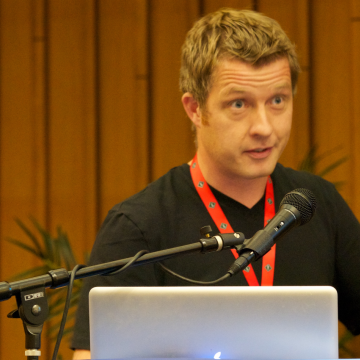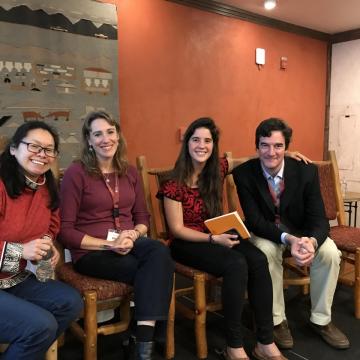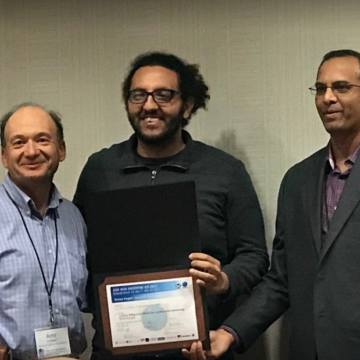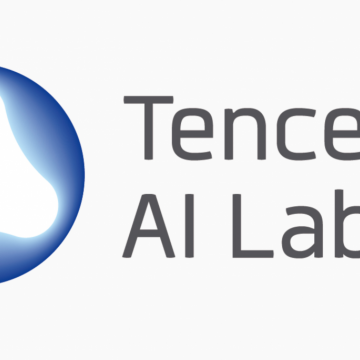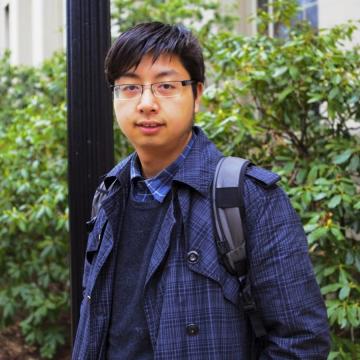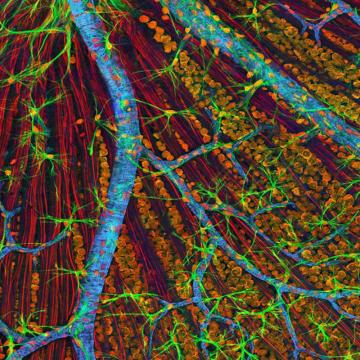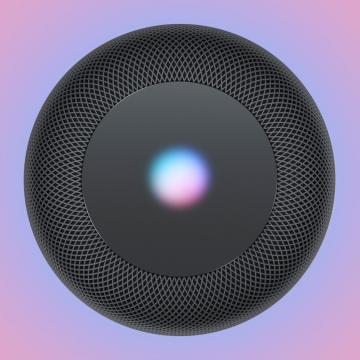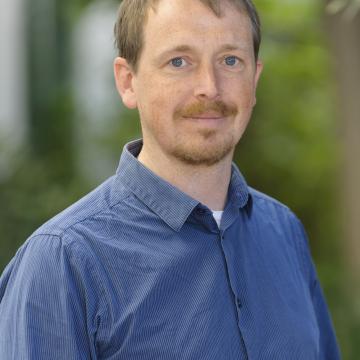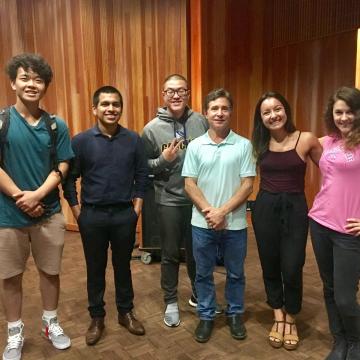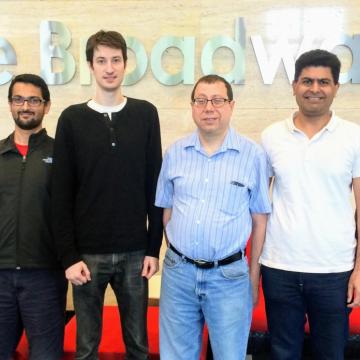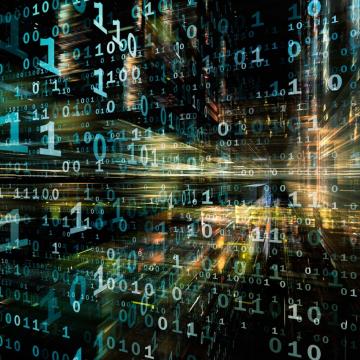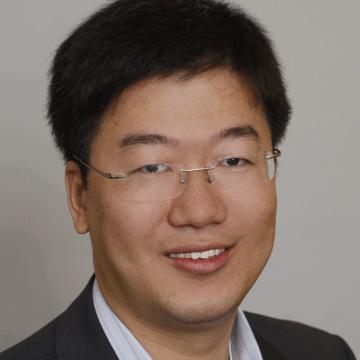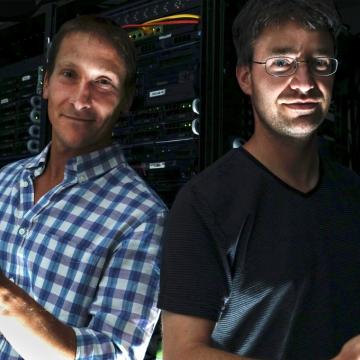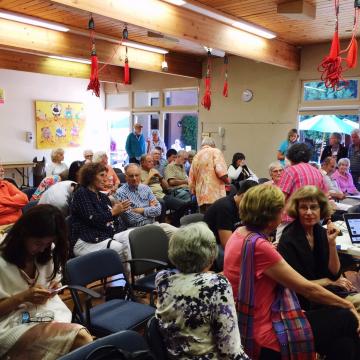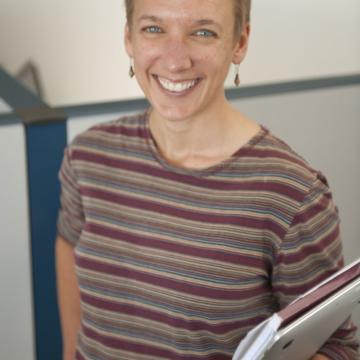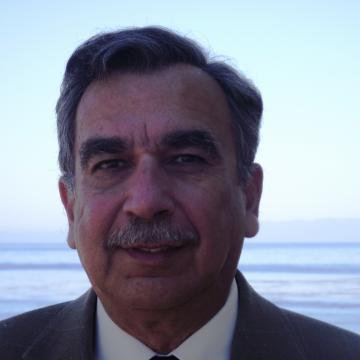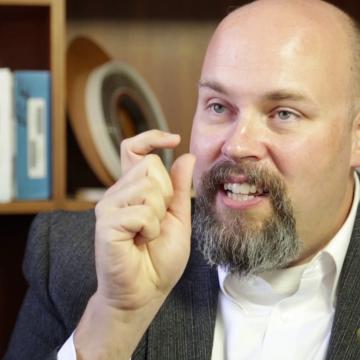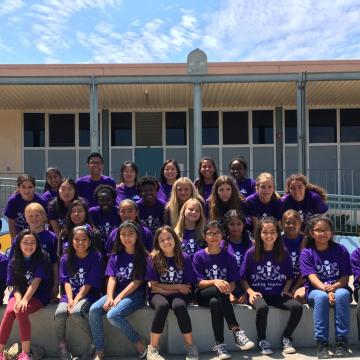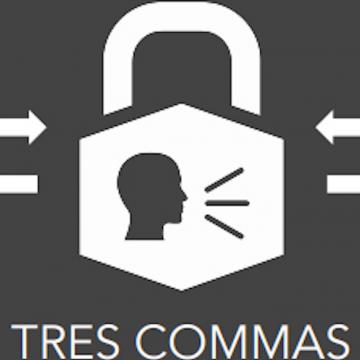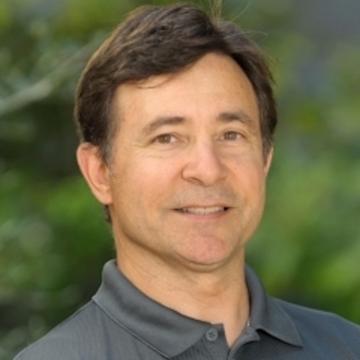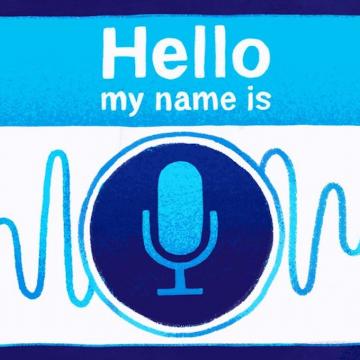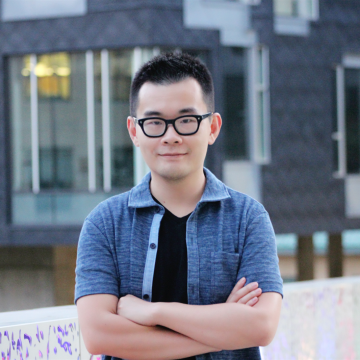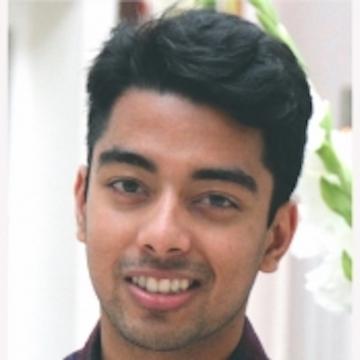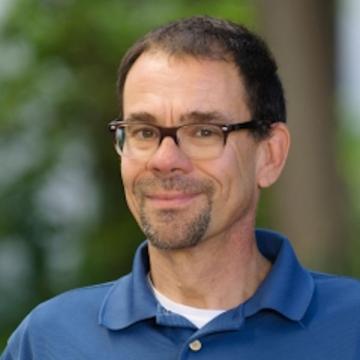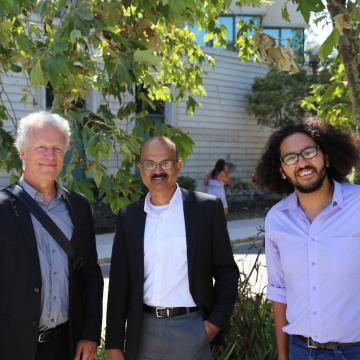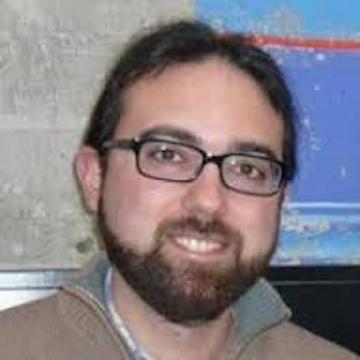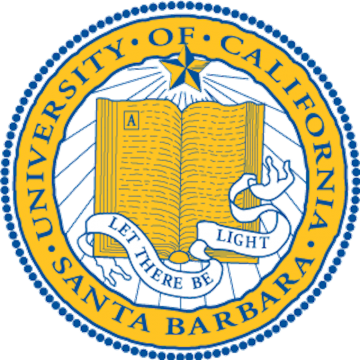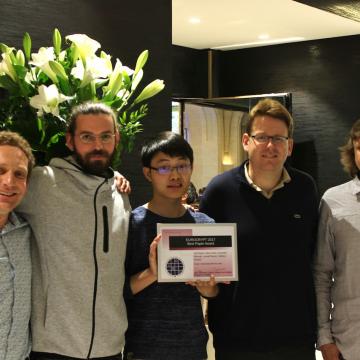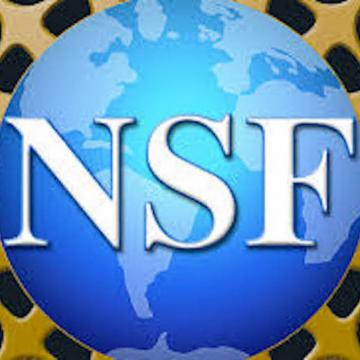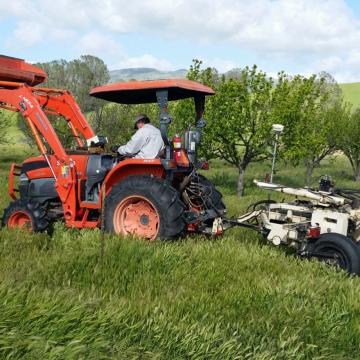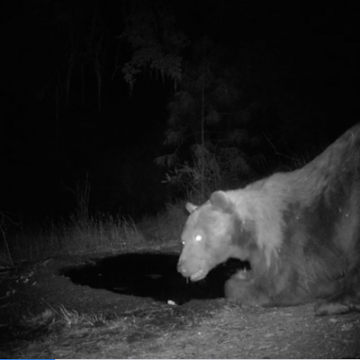News Archive
Computer Science Researcher Dr. John O'Donovan collaborated with a team led by Dr. Jin-Hee Cho at Army Research Lab, and their paper titled "Modeling and Analysis of Uncertainty-based False Information Propagation in Social Networks," has recently received the GLOBECOM 2017 Best Paper Award in the Selected Areas in the Communications symposium track in Singapore this week. The paper was authored by Cho, Trevor Cook, also of ARL; Scott Rager, Raytheon BBN Technologies; John O'Donovan, University of California, Santa Barbara; and Sibel Adali, Rensselaer Polytechnic Institute.
Diba Mirza, a Lecturer PSOE in the Department of Computer Science, along with Susko Tyler, a Lecturer PSOE in Mechanical Engineering, have been selected as the co-recipients of this year’s Northrop Grumman Excellence in Teaching Award.
The Internet Society recently held an Indigenous Connectivity Summit focused on connecting Indigenous communities in North America to the Internet. Prof. Elizabeth Belding spoke on a panel titled “Advocating for Community Networks” about the work she has done with her Native American partner organizations to understand how Indigenous people use the Internet, and to build Internet access and architectural solutions that are more inclusive of Indigenous populations.
The Department of Computer Science would like to congratulate PhD students Victor Zakhary, Theodore Georgiou, Cetin Sahin, and Prof. Amr El Abbadi for 2nd Place Vision Paper at SIGSPATIAL 2017 for their paper "LocBorg: Hiding Social Media User Location while Maintaining Online Persona". Nice work!
Prof. Yinghui Wu, a former postdoc in Prof. Xifeng Yan's lab, receives the 2017 SIGMOD Best Paper Award. Prof. Wu spent three years as a postdoctoral research scientist during Aug 2011 - Aug 2014 at UCSB's CS Department, and then went on to become a professor in the School of EECS at Washington State University.
Sayan Ranu, a PhD graduate from Prof. Ambuj Singh's lab, is recently featured in the Hindu Business Line for his work that appears at the Bioinformatics journal. After graduated from UCSB's CS department, Dr. Ranu became a researcher at IBM Research Bangalore, and then an assistant professor at the renowned IIT Madras. Last year, Dr. Rano moved on to the CSE department at IIT Delhi.
This year marks the 10th anniversary of Apple's iPhone. It was the introduction of iPhone's Siri that for the first time in history, spoken dialogue systems were made widely available to the general public. Over the years, Siri has improved over time, and new intelligent assistants, such as Amazon Alexa, Google Home, and Cortana were also introduced to the market. But how are they now?
CS Prof. Wim van Dam was awarded a single-PI NSF grant of $450k for a three year period to work on the project "Quantum Data Structures and Algorithms".
CS Prof. Matthew Turk, who is widely known for his seminal work in face recognition and computer vision, gave an invited talk to the Santa Barbara City College Math Club (https://www.facebook.com/groups/sbccmathclub/) on Friday, September 29, on “Mathematics for Seeing,” discussing mathematical models and methods used in computer vision.
Visa research lab awarded UCSB Computer Science Professor Xifeng Yan a gift award to support Professor Yan’s research in the areas of data mining, machine learning, and artificial intelligence.
Visa Research is a research community of scientists and engineers conducting applied research on the challenging problems in the payment industry and provides technical thought leadership to guide the company's future.
Software permeates every aspect of our world, from our homes to the critical infrastructure. As the size and complexity of software systems increase, the number and sophistication of software security flaws increase as well. Because of the potentially catastrophic effect of the exploitation of these vulnerabilities, a substantial amount of resources is devoted to finding these flaws before they are discovered by attackers and exploited in the wild.
What is Aritificial Intelligence (AI)? How did AI grow in the past few decades? What are the state-of-the-art of AI technologies now, and how about AI's future?
On Saturday 08/19, UCSB CS researchers Drs. John O'Donovan and William Wang gave an invited talk at the Humanist Society of Santa Barbara.
ABET is a non-profit organization that accredits post-secondary education programs in applied science, computing, engineering, and engineering technology.
Professor Emeritus Teofilo F. Gonzalez has been a CAC Program Evaluator (5 years) and CAC Commissioner (5 years). Currently he contributes to the CAC Commission as a Team Chair evaluating CAC programs. In the past 12 months the Commission reviewed 125 individual computing programs in 100 institutions around the world. The goal was to improve computing education in United States.
What would be the best way to spend a memorable Summer in Santa Barbara? Ocean, beaches, sunshine, and what?
UCSB computer science teaching faculty Diba Mirza is now hosting a coding camp with Dos Pueblos High this Summer.
Congratulations to Capstone 2016-17 Senior Project 1st Place winners Tres Commas! Team members Jonathan Easterman (lead), Carson Holoien, Vince Nicoara, Shasha Shams, Arda Ungun, and Vince Nicoara were mentorerd by industry partner Invoca, represented by Mike Weaver and Colin Kelley. Their winning project titled Voice Biometrics Integration, utilized easy-to-deploy automated voice authentication to speed-up the authentication process for call centers of any size.
We are pleased to announce that Professor Matthew Turk will serve as Chair of the Department of Computer Science, upon the recommendation of Rod Alferness, Dean of UCSB's College of Engineering. In his new role effective July 1, 2017, Professor Turk succeeds Professor Ambuj Singh, who served as CS Department Chair since July 2014.
“Machines need to not just understand human language, but learn how to generate human language,” contends Assistant Professor William Wang. Improving the ability for computers to converse with humans, and vice versa, is the focus of Wang's research. Think iPhone's Siri, Amazon's Alexa, Microsoft's Cortana...and beyond.
Assistant Professor William Wang has been selected to receive the highly competitive IBM Faculty Award for 2017 which, as stated in the IBM Global University Programs award letter, "...recognizes the quality of your program and its importance to our industry."
Third-year honors student Abhishek Bhattacharya, a computer science and biology double major, is using the power of artificial intelligence to help in the detection of skin cancer and so far, has proven a 96 percent accuracy rating with his neural network model.
Read about his collaborative work in The UCSB Current article, "To Treat or Not to Treat," here.
For the second year in a row, CS graduating seniors have selected Prof. Rich Wolski to receive the distinction of "Outstanding Faculty." Wolski was honored during the Class of 2017 Senior Send-Off program.
Congratulations!
The recipient of the 2017 College of Engineering (CoE) Alumni Award is John E. Gerngross, Jr. This award recognizes outstanding achievement in engineering or technology by an individual whose accomplishments serve as a role model for future CoE students.
Leading by example. That's the theme of "Dreaming Big," an article in The UCSB Current featuring the work of four UCSB College of Engineering professors whose classroom teachings address not only UCSB students, but global issues as well.
Our congratulations to Professors Chandra Krintz and Rich Wolski, on being invited to participate on the keynote panel "Cloud Computing Status and the Future" during the 10th IEEE International Conference on Cloud Computing, in Honolulu, Hawaii, June 25-30, 2017.
Gianluca Stringhini is now Assistant Professor in the Departments of Computer Science and Security and Crime Science at University College London. In this Nature article titled "Shining a light on the dark corners of the web," Stringhini explains how he studies hate speech and fake news on the underground network 4chan. Read the interview here.
Professor and Chair Ambuj Singh this year has welcomed 16 Regents Scholars students to the Computer Science Department. The Regents Scholarship recognizes undergraduate students with exceptional academic promise and achievements. Computer Science is pleased to announce that 16 students have been awarded Regents Scholarships, each receiving $6,000 per year for four years.
Congratulations to CS undergraduate student John Lau, on receiving an award from the United Airlines Scholarship Fund for use toward his educational expenses! United Airlines investments in the education and development of hundreds of undergraduate and graduate students by awarding more than $1 million in scholarships to its employees and their families through the United Scholarship Fund (USF).
Prof. Stefano Tessaro and CS graduate student Binyi Chen receive "Best Paper Award" at EUROCRYPT '17
CS graduate student Binyi Chen and Professor Stefano Tessaro received the "Best Paper Award" at EUROCRYPT 2017 in Paris, one of the two top-tier yearly conferences in cryptography devoted to all aspects of cryptology.
For their project titled, "Defending Cyber-Physical Systems Using Federated Learning of Physical Models," Professors Giovanni Vigna and Christopher Kruegel have been awarded a $2 million grant by the Office of Naval Research.
Timely new research by Assistant Professor William Wang is attempting to determine if machines can do a better job of spotting fake news than human beings. To that end, Wang created LIAR, the largest-ever database of fake news; in an effort to train machines to automatically detect deception.
In an article titled "Google Can Finally Understand Your Drunk Texts," Assistant Professor William Wang comments on the design of Tacotron -- Google's newest artificial intelligence program. Tacotron is an end-to-end generative text-to-speech model that synthesizes speech directly from characters. Prof. Wang is a natural language processing expert who is familiar with Google's Tacotron research.
Assistant Professor Rachel Lin has received the National Science Foundation’s Faculty Early Career Development (CAREER) award for her work on the topic, "Obfuscation from a Complexity Theoretic Perspective."
The extremely competitive NSF CAREER award makes it possible for an assistant professor in science or engineering to launch an ambitious research program.
Professors Chandra Krintz and Elizabeth Belding talk with the Pacific Coast Business Times about their respective efforts to benefit rural and remote communities through big data and wireless technology. Read the full story here.
